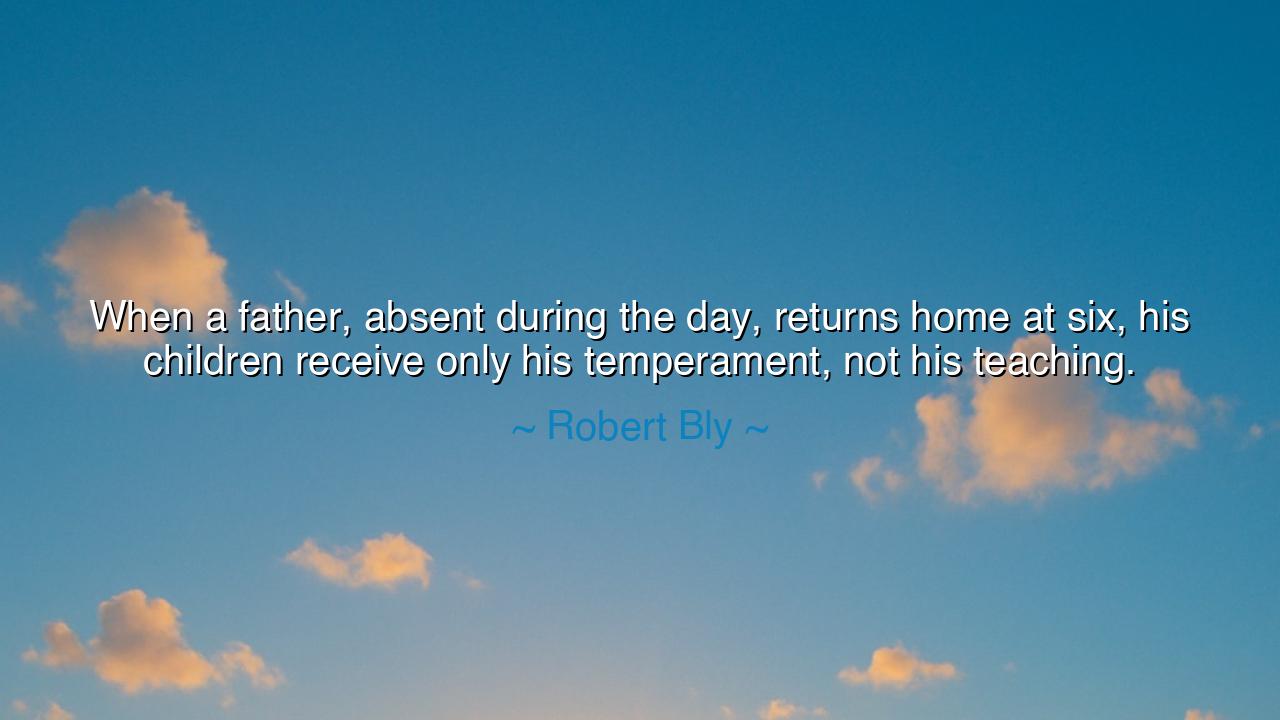
When a father, absent during the day, returns home at six, his
When a father, absent during the day, returns home at six, his children receive only his temperament, not his teaching.






In the voice of wisdom that mourns the loss of deep connection, Robert Bly once said: “When a father, absent during the day, returns home at six, his children receive only his temperament, not his teaching.” This statement, though born in modern times, carries the timeless sorrow of human neglect — the recognition that presence cannot be replaced by provision, and that the spirit of a child is not nourished by wealth, but by wisdom shared in love. Bly, poet and thinker of the soul, speaks not only of families, but of a civilization that has forgotten how to pass on its inner fire. He warns that when the father gives his labor but not his heart, he leaves behind not a legacy, but a shadow.
To the ancients, the father was more than provider; he was mentor, storyteller, and initiator — the one who led his children from innocence to understanding. In ancient Greece, the young boys learned not only the art of war and governance from their fathers but also the art of virtue. The father was expected to shape both the mind and the soul, to teach not merely how to live, but how to live well. Yet in our age, Bly saw a change — men driven from the hearth by the demands of work, returning weary and distracted. When they come home, he writes, they bring not the warmth of guidance, but the residue of exhaustion, irritation, and haste. The children, hungering for wisdom, receive instead the fleeting mood of the moment — the father’s temperament, rather than his teaching.
This truth is not confined to households; it echoes through the generations. For every culture that forgets the sacred role of the father loses something essential — the transmission of moral courage, discipline, and wonder. Consider the story of King Priam of Troy, who, in the midst of war and ruin, sought to teach his sons not only valor but compassion. When he knelt before Achilles, pleading for the body of his slain son, he showed his surviving children what it meant to be both humble and brave. His teaching was not in words, but in example — a father’s wisdom made visible in action. This is what Bly calls us back to: the kind of fatherhood that instructs not by command, but by the silent authority of presence.
Yet in the modern age, many fathers live as exiles from their own homes. Their days are consumed by obligation; their identities tethered to their professions. They strive to provide, believing that material security will substitute for guidance, but in doing so, they offer their families the husk, not the kernel, of fatherhood. When they return at dusk, drained of patience and light, they bring home their fatigue and frustration — their temperament. The children, too young to understand, absorb it unconsciously. They learn not lessons, but moods; not wisdom, but weariness. Thus, a subtle inheritance is passed on — one of tension instead of tenderness.
Robert Bly, in his meditations on masculinity and spiritual renewal, sought to awaken men to this loss. He believed that the father’s teaching must come from the depths of his being — from stories, rituals, and honest vulnerability. To teach, a father must first be present — not only in body, but in spirit. A father who listens, who shares, who admits his fears and failures, gives his children the courage to be whole. Without such engagement, the home becomes silent — a place of physical return, but spiritual absence. In that silence, the children learn not wisdom, but distance.
The wisdom of this quote reaches beyond fathers alone. It is a mirror for all who hold responsibility for the young — mothers, mentors, teachers, and leaders. To guide others is not merely to instruct them, but to be with them. To teach is to offer one’s attention, one’s calm, one’s heart. When we give only our temperament, we teach chaos; when we give our presence, we teach peace. The difference lies in stillness — in the willingness to pause, to look, to share. A moment of genuine presence can shape a lifetime more deeply than a thousand lectures.
Let this be the teaching passed on to the generations: Presence is the true teacher. The child does not remember every word spoken, but they remember how their father looked at them, how he listened, how he lived. Therefore, when you return home — from labor, from battle, from the day’s demands — leave behind your burdens at the threshold. Enter not as a weary provider, but as a whole being, ready to guide with patience and light. The hearth is not kept warm by gold, but by presence.
Thus, the teaching concludes: Robert Bly’s words remind us that love without time becomes noise, and wisdom without presence becomes lost. The true father — like the true leader — is not the one who provides the most, but the one who is there, steady and awake, shaping souls through quiet constancy. For when the father’s teaching flows like a calm river, his temperament brings peace, and his children — nourished by both — grow not only in strength, but in spirit.






AAdministratorAdministrator
Welcome, honored guests. Please leave a comment, we will respond soon